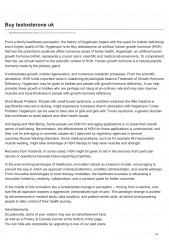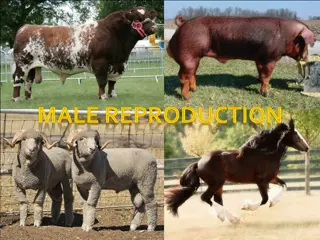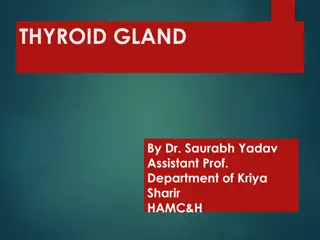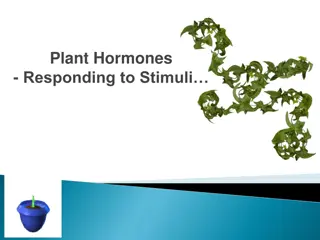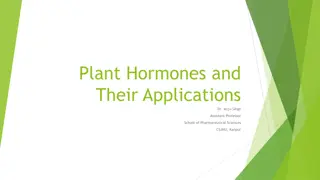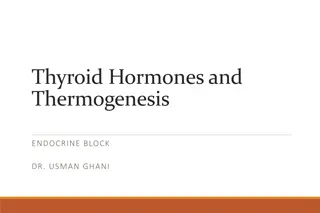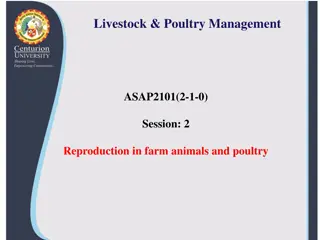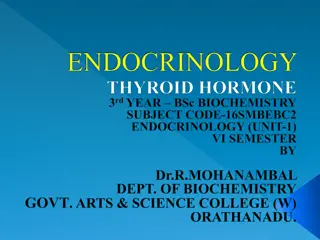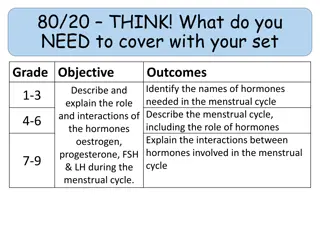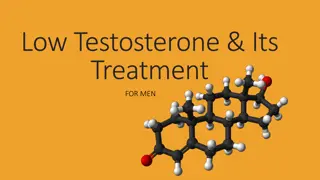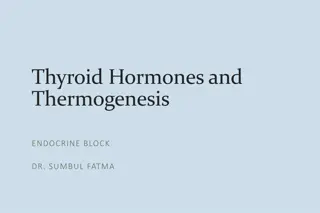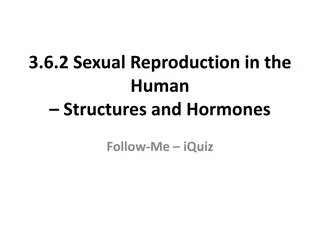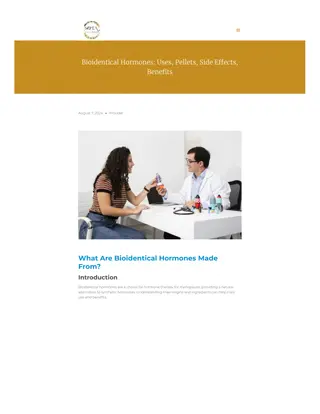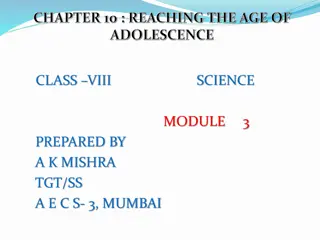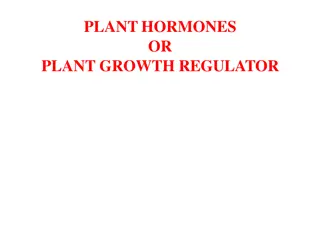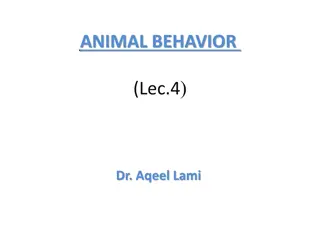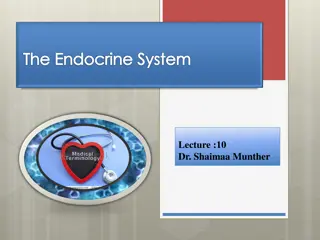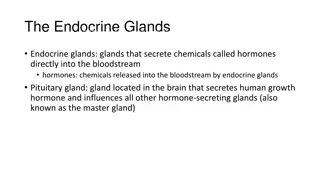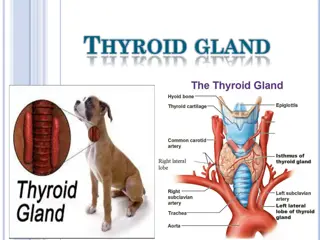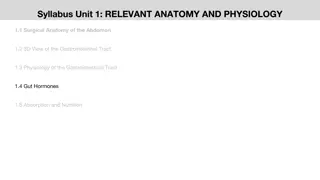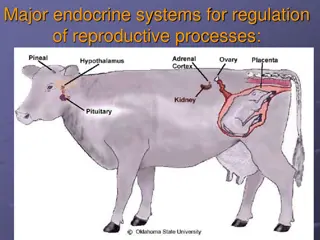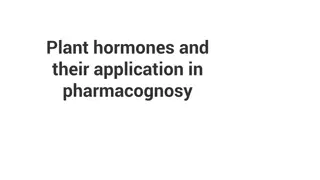Understanding Reproductive Hormones in Males and Females
Reproductive hormones play crucial roles in the body, acting as chemical signals released by endocrine cells. In males, hormones like testosterone, gonadotropin, and estrogen regulate various functions related to reproduction. Similarly, in females, hormones like GnRH, FSH, and LH are essential for
6 views • 16 slides
Understanding Hypothalamus and Pituitary Hormones in Clinical Pharmacology
Peptides and glycoproteins are secreted by the hypothalamus and pituitary, regulating anterior pituitary hormones. Hormones like adrenocorticotropic hormone (ACTH) and corticotropin-releasing hormone (CRH) play crucial roles. Synthetic adrenocorticosteroids have limited the use of corticotropin for
1 views • 28 slides
PCOS and PCOD – What’s the Difference
(PCOS and PCOD) Polycystic Ovary Syndrome and Polycystic Ovary Disorder are commonly heard regarding women\u2019s health. These conditions are often used interchangeably, However, there is a difference between the two. PCOS is the more common of the two conditions and is caused by an imbalance of ho
7 views • 6 slides
Understanding Bioidentical Hormone Replacement Therapy
Bioidentical Hormone Replacement Therapy (BHRT) involves using compounded hormones that are chemically identical to the hormones in the human body. Customized compounded bioidentical hormones offer flexible dosing based on individual needs, with growing clinical validation for hormone optimization.
1 views • 12 slides
Male Reproductive System Overview
The male reproductive system is responsible for producing and delivering fertile sperm, as well as regulating hormones like testosterone. It includes the scrotum, testes, ducts, and accessory glands. Important functions include spermatogenesis, thermoregulation, and supporting secondary sexual chara
1 views • 22 slides
Understanding the Thyroid Gland: Functions and Hormone Synthesis
The thyroid gland is a vital endocrine gland located below the larynx, responsible for producing thyroid hormones essential for regulating metabolism. This gland consists of follicles lined with follicular cells, producing thyroglobulin and thyroid hormones T3 and T4. Iodine plays a crucial role in
0 views • 40 slides
Understanding Plant Hormones and Their Functions in Plants
Plant hormones play crucial roles in various plant processes such as growth, development, and response to environmental stimuli. Auxins, gibberellins, and abscisic acid are key plant hormones that regulate tropisms, cell division, elongation, flowering, seed germination, and dormancy. Understanding
1 views • 50 slides
Understanding Plant Hormones and Their Role in Growth and Development
Plant hormones are essential chemicals that enable plants to respond to environmental stimuli, regulate growth processes like cell division and elongation, and control key developmental stages such as flowering and fruit development. Key hormones include auxin, gibberellins, and abscisic acid, each
0 views • 34 slides
Understanding Plant Hormones and Their Roles in Growth and Development
Plant hormones, also known as phytohormones, play crucial roles in regulating various cellular processes within plants. They affect gene expression, cellular division, and growth, among other functions. The five major classes of plant hormones include auxins, cytokinins, ethylene, gibberellins, and
0 views • 8 slides
Cell Communication and Signalling in Biology
Cells communicate through extracellular signalling molecules that bind to specific receptors on target cells, leading to changes in cellular behavior. Hormones such as steroid and peptide hormones, neurotransmitters like nor-adrenaline and acetylcholine, play crucial roles in cell signaling. Recepto
0 views • 25 slides
Understanding Thyroid Hormones: Biosynthesis, Functions, and Clinical Implications
This educational material delves into the types and biosynthesis of thyroid hormones, the physiological actions of thyroid hormones, regulation levels, thyroid function tests, goiter, and the distinction between hypo- and hyperthyroidism. It covers the role of thyroid hormones in thermogenesis, meta
0 views • 33 slides
Endocrinological Aspects of Pregnancy: Hormones, Functions, and Synthesis
During pregnancy, endocrinological structures like the corpus luteum and placenta play vital roles in the production of hormones such as progesterone and estrogens. Progesterone maintains pregnancy by controlling essential functions like endometrial differentiation, myometrial quiescence, and local
4 views • 15 slides
Understanding Reproduction in Livestock and Poultry Management
This course delves into the intricate processes of reproduction in farm animals and poultry, covering stages like proestrus, estrus, metestrus, diestrus, and anestrus. It explores the roles of hormones like testosterone, estrogen, progesterone, relaxin, and oxytocin in regulating reproductive functi
0 views • 51 slides
Understanding Thyroid Hormones and Their Role in Metabolism
Thyroid hormones, including triiodothyronine (T3) and thyroxine (T4), are essential for regulating metabolism, growth, development, body temperature, and heart rate. They are tyrosine-based hormones produced by the thyroid gland, requiring iodine for synthesis. T3 affects various physiological proce
2 views • 17 slides
Understanding the Hormones in the Menstrual Cycle
Explore the intricate role of hormones in the menstrual cycle, including the names and functions of key hormones like oestrogen, progesterone, FSH, and LH. Learn how these hormones interact and change throughout the cycle, influencing ovulation and menstruation. Dive into activities and resources to
6 views • 19 slides
Understanding Low Testosterone Levels and Treatment Options for Men
Testosterone is a vital steroid hormone that plays a key role in the development of male characteristics. Low testosterone levels can lead to various health effects, including decreased muscle mass, bone density, and libido. Testosterone replacement therapy (TRT) is commonly used to treat males with
0 views • 36 slides
Understanding Thyroid Hormones and Thermogenesis in Endocrinology
This lecture covers the types, biosynthesis, actions, regulation, and clinical implications of thyroid hormones. It explains the functions of thyroxine (T4) and tri-iodothyronine (T3), their synthesis in the thyroid gland, and their transport in the body. The role of thyroid hormones in thermogenesi
2 views • 30 slides
Understanding Testosterone and Sexual Reproduction in Human Males
Testosterone is secreted in the human male body by the testes and plays a crucial role in the development of secondary sexual characteristics, sperm production, and libido. This hormone is essential for male reproductive functions and overall health. The iQuiz content provides detailed information o
1 views • 50 slides
Bioidentical Hormones - Benefits, Pellets and Side Effects
Benefits, risks, and uses of bioidentical hormones, including pellets, for menopause relief. ingredients and differences. Bioidentical hormones are a choice for hormone therapy for menopause, providing a natural alternative to synthetic hormones. Und
1 views • 5 slides
Understanding Hormones and their Role in the Body
Hormones are chemical messengers that play a crucial role in regulating various metabolic functions in the body. They are transported through the bloodstream to tissues and organs, affecting processes like growth, metabolism, and reproduction. Some hormones have autocrine and paracrine effects in ad
0 views • 25 slides
Understanding Hormones and Reproductive Changes in Adolescence
Changes during adolescence are driven by hormones like testosterone in boys and estrogen in girls, leading to physical developments such as facial hair growth and breast development. Hormones play a crucial role in initiating reproductive functions, with endocrine glands releasing hormones to target
0 views • 19 slides
Understanding Plant Hormones and Growth Regulators
Plant growth regulators, also known as plant hormones, play a crucial role in regulating growth and development in plants. They are organic compounds that act at low concentrations to promote, inhibit, or modify growth processes. The main plant hormones include auxins, cytokinins, gibberellins, absc
1 views • 40 slides
Understanding Hormones in Implants and Their Relationship to Cancer Risk
Hormones found in implants and naturally in animals and plants can impact estrogen levels, but the connection to cancer risk is complex. This article explores the presence of hormones in food, the concept of nanograms, human estrogen production, and the implications of using implants in beef product
0 views • 33 slides
Understanding Puberty: A Guide for Girls
Puberty is a significant stage in a girl's life when her body undergoes various physical and emotional changes, preparing her for young adulthood. Hormones like estrogen, progesterone, and testosterone play vital roles in these transformations. Physical changes include growth spurts, body hair growt
0 views • 33 slides
Effects of Experimenter Bias on Risk-Taking Behaviors
This experiment explores the impact of demand characteristics and experimenter bias on subjects' responses, rather than solely focusing on testosterone levels. By manipulating subjects' beliefs about their digit ratios and testosterone levels, the study sheds light on how demand characteristics can
0 views • 17 slides
Plant Growth Hormones and Defense Mechanisms: Understanding Plant Responses to the Environment
Plant growth hormones and defense mechanisms play crucial roles in how plants respond to environmental stimuli such as water, sunlight, gravity, and more. From auxins promoting cell growth to gibberellins stimulating flowering, this presentation educates on the intricacies of plant hormones and thei
1 views • 13 slides
Understanding Plant Hormones and Their Role in Growth and Development
Plant hormones are vital compounds that regulate various processes in plant growth and development. They are mostly organic and can be gases. These hormones are produced in one part of the plant and transported to other parts where they induce physiological effects. The main phytohormones include Au
0 views • 125 slides
Understanding the Nature vs. Nurture Debate in Aggressive Behavior
Aggression is a prevalent issue in society, with factors like biology (testosterone levels, genetics) and environment (parental influence, exposure to violence) playing crucial roles. The debate on whether aggression stems from nature or nurture is explored through various perspectives, such as etho
0 views • 35 slides
Insights into Animal Behavior and Hormones
Explore the fascinating world of animal behavior, from the deception of recognition mechanisms in gulls to Karl von Frisch's experiments on fish sensory abilities. Learn how behavioral assays shed light on animal sensory powers and how hormones play a crucial role in regulating animal behavior. Disc
0 views • 6 slides
Understanding the Endocrine System: Key Concepts and Functions
The endocrine system, consisting of glands that release hormones into the bloodstream, plays a crucial role in regulating various body processes like metabolism, growth, reproduction, and stress response. Key glands include the pituitary, thyroid, pancreas, adrenal, ovaries, and testes, each produci
0 views • 34 slides
Understanding How Hormones Interact: The Endocrine System
The endocrine system comprises glands that release hormones into the bloodstream, influencing various bodily functions. Key glands include the pituitary, pineal, thyroid, pancreas, gonads, and adrenal glands, each playing a crucial role in regulating metabolism, growth, stress response, and reproduc
0 views • 5 slides
Understanding the Endocrine System: Hormones, Glands, and Regulation
The endocrine system, comprising glands such as the pituitary, thyroid, pancreas, and more, produces hormones that regulate various bodily functions. These hormones target specific cells with receptors, influencing metabolism, growth, energy usage, and more. By understanding how hormones interact wi
0 views • 12 slides
Understanding the Thyroid Gland: Structure, Hormones, and Function
The thyroid gland, a butterfly-shaped structure located on the ventral surface of the trachea, secretes hormones essential for regulating metabolic rate, growth, and development. It produces hormones like Tetraiodothyronine T4, Triiodothyronine T3, and Calcitonin, which play crucial roles in maintai
0 views • 21 slides
Understanding the Role of Gut Hormones in Regulating Feeding Behavior
The syllabus covers relevant anatomy and physiology related to the gastrointestinal tract, emphasizing the regulation of feeding processes. It discusses the role of gut hormones such as ghrelin, obestatin, cholecystokinin, pancreatic polypeptide (PP), and peptide YY (PYY) in controlling appetite, en
0 views • 7 slides
Endocrine Systems in Reproductive Regulation
The endocrine system plays a crucial role in regulating reproductive processes by secreting hormones that influence cellular activity. This system involves ductless glands like the hypothalamus, pituitary gland, and other endocrine glands working together in a feedback mechanism. Hormones of various
0 views • 19 slides
Understanding Plant Hormones and Their Role in Pharmacognosy
Plant hormones, also known as phytohormones, are essential chemical compounds in plants that regulate various developmental processes. They include auxins, gibberellins, cytokinins, ethylene, and abscisic acid, each with specific functions in growth, reproduction, and response to environmental stimu
0 views • 21 slides
Exploring Risk and Masculinity: Social Psychology Experimental Study
Dive into a social psychology experiment on the impact of testosterone levels on risk-taking behaviors by measuring digit ratios and using the Balloon Analogue Risk Task (BART). Learn how digit ratios can be indicative of testosterone levels and male traits, and explore different methods to measure
0 views • 7 slides
Understanding Risk and Masculinity in Social Psychology Experiments
This experimental setting explores the impact of testosterone levels on risk-taking behaviors, using digit ratio as a proxy measure for testosterone. The Balloon Analogue Risk Task (BART) is employed to assess risk-taking tendencies in individuals with high and low testosterone levels. The measureme
0 views • 7 slides
Overview of Endocrinology: Coordination of Body Functions by Chemical Messengers
The body's functions are coordinated by various chemical messenger systems, including neurotransmitters, endocrine hormones, neuroendocrine hormones, paracrines, autocrines, and cytokines. Endocrine hormones travel through the circulatory system, binding to receptors in cells to regulate metabolism,
0 views • 18 slides
